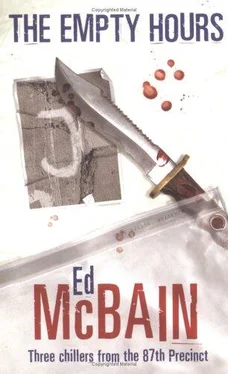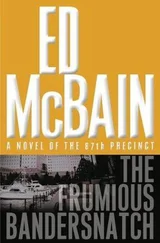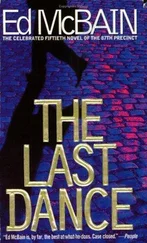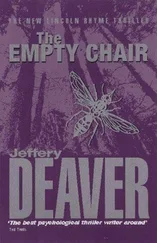“At about seven-thirty.”
“And the rabbi was here? Is that right?”
“Well, he stepped outside when services were over.”
“And you stayed inside. Was there any special reason?”
“Yes. I was collecting the prayer shawls and the yarmelkas, and I was putting —”
“Yarmelkas are skullcaps,” Meyer said. “Those little black —”
“Yes, I know,” Carella said. “Go ahead, Mr. Cohen.”
“I was putting the rimonim back onto the handles of the scroll.”
“Putting the what, sir?” Carella asked.
“Listen to the big Talmudic scholar,” Meyer said, grinning. “Doesn’t even know what rimonim are. They’re these decorative silver covers, Steve, shaped like pomegranates. Symbolizing fruitfulness, I guess.”
Carella returned the grin. “Thank you,” he said.
“A man has been killed,” Yirmiyahu said softly.
The detectives were silent for a moment. The banter between them had been of the faintest sort, mild in comparison to some of the grisly humor that homicide detectives passed back and forth over a dead body. Carella and Meyer were accustomed to working together in an easy, friendly manner, and they were accustomed to dealing with the facts of sudden death, but they realized at once that they had offended the dead rabbi’s sexton.
“I’m sorry, Mr. Cohen,” Carella said. “We meant no offense, you understand.”
The old man nodded stoically, a man who had inherited a legacy of years and years of persecution, a man who automatically concluded that all Gentiles looked upon a Jew’s life as a cheap commodity. There was unutterable sadness on his long, thin face, as if he alone were bearing the oppressive weight of the centuries on his narrow shoulders.
The synagogue seemed suddenly smaller. Looking at the old man’s face and the sadness there, Meyer wanted to touch it gently and say, “It’s all tight, tsadik, it’s all right,” the Hebrew word leaping into his mind — tsadik, a man possessed of saintly virtues, a person of noble character and simple living.
The silence persisted. Yirmiyahu Cohen began weeping again, and the detectives sat in embarrassment on the folding chairs and waited.
At last Carella said, “Were you still here when the rabbi came inside again?”
“I left while he was gone,” Yirmiyahu said. “I wanted to return home. This is the Pesach, the Passover. My family was waiting for me to conduct the seder.”
“I see.” Carella paused. He glanced at Meyer.
“Did you hear any noise in the alley, Mr. Cohen?” Meyer asked. “When the rabbi was out there?”
“Nothing.”
Meyer sighed and took a package of cigarettes from his jacket pocket. He was about to light one when Yirmiyahu said, “Didn’t you say you were Jewish?”
“Huh?” Meyer said. He struck the match.
“You are going to smoke on the second day of Pesach?” Yirmiyahu asked.
“Oh. Oh, well ...” The cigarette felt suddenly large in Meyer’s hand, the fingers clumsy. He shook out the match. “You — uh — you have any other questions, Steve?” he asked.
“No,” Carella said.
“Then I guess you can go, Mr. Cohen,” Meyer said. “Thank you very much.”
“Shalom,” Yirmiyahu said, and shuffled dejectedly out of the room.
“You’re not supposed to smoke, you see,” Meyer explained to Carella, “on the first two days of Passover, and the last two, a good Jew doesn’t smoke, or ride, or work, or handle money or —”
“I thought this was a Conservative synagogue,” Carella said. “That sounds like Orthodox practice to me.”
“Well, he’s an old man,” Meyer said. “I guess the customs die hard.”
“The way the rabbi did,’ Carella said grimly.
They stood outside in the alley where chalk marks outlined the position of the dead body. The rabbi had been carted away, but his blood still stained the cobblestones, and the rampant paint had been carefully sidestepped by the laboratory boys searching for footprints and fingerprints, searching for anything which would provide a lead to the killer.
“J,” the wall read.
“You know, Steve, I feel funny on this case,’Meyer told Carella.
“I do, too.”
Meyer raised his eyebrows, somewhat surprised. “How come?”
“I don’t know. I guess because he was a man of God.” Carella shrugged. “There’s something unworldly and naive and — pure, I guess — about rabbis and priests and ministers and I guess I feel they shouldn’t be touched by all the dirty things in life.” He paused. “Somebody’s got to stay untouched, Meyer.”
“Maybe so,” Meyer paused. “I feel funny because I’m a Jew, Steve.” His voice was very soft. He seemed to be confessing something he would not have admitted to another living soul.
“I can understand that,” Carella said gently.
“Are you policemen?”
The voice startled them. It came suddenly from the other end of the alley, and they both whirled instantly to face it.
Instinctively, Meyer’s hand reached for the service revolver holstered in his right rear pocket.
“Are you policemen?” the voice asked again. It was a woman’s voice, thick with a Yiddish accent. The street lamp was behind the owner of the voice. Meyer and Carella saw only a frail figure clothed in black, pale white hands clutched to the breast of the black coat, pinpoints of light burning where the woman’s eyes should have been.
“We’re policemen,” Meyer answered. His hand hovered near the butt of his pistol. Beside him, he could feel Carella tensed for a draw.
“I know who killed the rov? the woman said.
“What?” Carella asked.
“She says she knows who killed the rabbi,’ Meyer whispered in soft astonishment.
His hand dropped to his side. They began walking toward the street end of the alley. The woman stood there motionless, the light behind her, her face in shadow, the pale hands still,, her eyes burning.
“Who killed him?” Carella said.
“I know the rotsayach” the woman answered. “I know the murderer.”
“Who?” Carella said again.
“Him!” the woman shouted, and she pointed to the painted white J on the synagogue wall. “The sonei Yisroel! Him!”
“The anti-Semite,” Meyer translated. “She says the anti-Semite did it.”
They had come abreast of the woman now. The three stood at the end of the alley with the street lamp casting long shadows on the cobbles. They could see her face. Black hair and brown eyes, the classic Jewish face of a woman in her fifties, the beauty stained by age and something else, a fine-drawn tension hidden in her eyes and on her mouth.
“What anti-Semite?” Carella asked. He realized he was whispering. There was something about the woman’s face and the blackness of her coat and the paleness of her hands which made whispering a necessity.
“On the next block,” she said. Her voice was a voice of judgment and doom. “The one they call Finch.”
“You saw him kill the rabbi?” Carella asked. “You saw him do it?”
“No.” She paused. “But I know in my heart that he’s the one ...”
“What’s your name, ma’am?” Meyer asked.
“Hannah Kaufman,” she said. “I know it was him. He said he would do it, and now he has started.”
“He said he would do what?” Meyer asked the old woman patiently.
“He said he would kill all the Jews.”
“You heard him say this?”
“Everyone has heard him.”
“His name is Finch?” Meyer asked her. “You’re sure?”
“Finch,” the woman said. “On the next block. Over the candy store.”
Читать дальше












